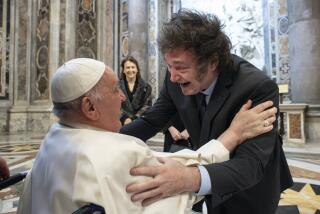Pope Francis visits a Brazil slum, scolds country’s leaders
RIO DE JANEIRO — Pope Francis waded into the heart of Brazil’s troubles Thursday, telling residents of a notorious slum that their leaders must do a better job of helping them.
The potentially provocative comments by the first pope from the Americas were in keeping with the causes he holds most dear: social justice and reaching out to the poor.
“No one can remain insensitive to the inequalities that persist in the world!” Francis told a rain-soaked crowd in the Varginha favela, or slum, which had been spruced up with new electrical cables and fresh asphalt. Yet ruins of shanty-type housing hulked a few yards away, and drug traffickers’ graffiti kept reappearing under the noses of military police.
Public authorities, the pope said to enthusiastic applause, and “those in possession of greater resources” must “never tire of working for a more just world, marked by greater solidarity!”
It was the most political message yet in the pope’s pilgrimage to Brazil, and for many it echoed the enormous protests that erupted last month among Brazilians angry over government corruption, excessive state spending on upcoming international sports events, and lack of basic services such as education and healthcare.
Venturing into the favela was probably the trickiest event in the pope’s week in Brazil, his first overseas trip since his election in March — one that has brought him back to his native continent.
Security, already frayed by Francis’ tendency to ignore restrictive rules, and logistics were complicated. The recently paved streets in the favela are narrow; large parts of the slum are essentially in ruins; and the crowds, while perhaps admiring of the pope, are unpredictable.
But the visit appeared to go off without major hitches.
Varginha, a slum so poor and violent that it’s sometimes referred to as the Gaza Strip, has benefited from small improvements aimed at stanching social unrest. But the pope seemed to be saying that such government efforts were not enough.
The most humble, he said, can offer the world a lesson in solidarity.
“Here, as in the whole of Brazil, there are many young people.... You have a particular sensitivity toward injustice, but you are often disappointed by facts that speak of corruption on the part of people who put their own interests before the common good,” the pope said at a refurbished soccer field, speaking accented but perfectly understandable Portuguese.
“To you and to all, I repeat: Never yield to discouragement, do not lose trust, do not allow your hope to be extinguished. Situations can change, people can change.”
Francis traveled to Varginha, on Rio de Janeiro’s northern edge, in a relatively modest silver sedan, not a limo, seated in the back and with the window rolled down. He then transferred to an open-sided popemobile from which he waved at followers swarming the vehicle and kissed the occasional baby hoisted in his direction.
Government sharpshooters lined the route.
Thousands of residents and visiting pilgrims waited in cold, steady rain for the pope’s arrival. Earlier in the day, he received the keys to the city and blessed some of Brazil’s potential Olympic athletes; later, he met with young people from his native Argentina, then presided over a celebration for World Youth Day, the official reason he is here.
“We were a little worried how this would go, but it was better than we could have imagined,” said Varginha resident Rosane Paulino dos Santos, a wedding florist and church volunteer. “How can we explain a blessing like this? … He knows how to speak to the young, and with the less fortunate.”
As a priest in his native Buenos Aires, the former Jorge Mario Bergoglio relied on his Jesuit-shaped faith to minister to the impoverished slums of the Argentine capital. At his election, he said the Roman Catholic Church should be “a poor church for the poor.”
Many Varginha residents seemed grateful for anyone to shine a light on their plight.
“He’s bringing hope to the community, especially the children, and showing them that you can get through anything with faith and goodwill,” said Suely Ribeiro, 58, an education worker.
“This is really important for us. He’s a representative of humility and caring and, most importantly, true peace, which is something we need here,” said Milena de Souza, 26, an office assistant. “Because of all the violence we’ve had here, hopefully the pope can bless us.”
Built on swampland, Varginha is one of several favelas that have been “pacified,” meaning the drug lords who once ran the place have been ejected or subdued by authorities. The government has allocated money for community centers, libraries and a train station.
But residents say they have received more broken promises than actual help, and basic services such as sanitation remain woefully unavailable. They also complain that police are abusive and treat everyone like a criminal.
At a small demonstration later Thursday, several hundred people gathered in front of the governor’s office to protest corruption and the disappearance of a favela resident, who protesters said had not been seen since being taken into police custody last week.
After praying at a stone chapel, the pope entered a small, freshly painted home festooned with balloons in the Vatican colors of yellow and white. Outside, the crowd jostled to catch a glimpse. Men drank beer and vendors sold popcorn.
The famously humble Francis is a sharp contrast to his stiff, academic predecessor, Benedict XVI. Given to casual jokes and armed with direct, accessible messages, he is starting to earn favorable comparisons to another charismatic successor to St. Peter: Pope John Paul II.
“It’s like with John Paul, there’s no question, from the start, that he loves us,” said Carolyn Straight, a pilgrim from Rescue, Calif., near Sacramento. She saw the late pope as a high-schooler in Rome, and traveled to Rio to see Francis.
Everaldo Oliveira, a 42-year-old electrician from the favela, who saw John Paul when he came to Brazil in 1997, noted a subtle difference.
“Francis’ style is very different,” Oliveira said. “John Paul made these big, forceful statements, while Francis gets closer to the people and speaks with more tenderness and care.”
The folksiness was on display Thursday.
“From the start,” he said, “my wish in planning this visit to Brazil was to be able to visit every district throughout the nation. I would have liked to knock on every door, to say ‘Good morning,’ to ask for a glass of cold water, to take a cafezinho, to speak as one would to family friends.”
One can almost imagine this pope actually doing that.
“But Brazil is so vast!” he said. “It is impossible to knock on every door!”
Bevins is a special correspondent.
More to Read
Sign up for Essential California
The most important California stories and recommendations in your inbox every morning.
You may occasionally receive promotional content from the Los Angeles Times.











